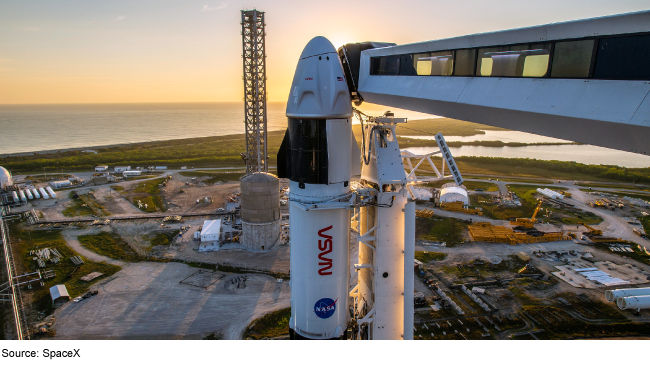Commercial Space Transportation: FAA's Oversight of Human Spaceflight
Fast Facts
The commercial space industry is rapidly growing as private companies transport cargo, satellites, and people to space. The Federal Aviation Administration oversees these commercial space operations.
FAA is working with industry as it prepares to potentially expand its oversight of operations with people on board. FAA chartered a rulemaking committee in April 2023 to solicit industry input on future regulations aimed at protecting people's health and safety in space.
Also, FAA is hiring additional staff to support the efforts. But recruiting an adequate talent pool has been challenging, so it's offering recruitment and relocation incentives.
The SpaceX Falcon 9 rocket with Dragon spacecraft at the Kennedy Space Center in Florida

Highlights
What GAO Found
The Federal Aviation Administration (FAA) oversees commercial space operations with humans onboard under its broader licensing framework. FAA requires commercial launch operators to obtain a license before conducting any operation within U.S. borders—whether they carry humans or payloads, such as satellites. To obtain a license, operators must demonstrate that they can conduct the operation without jeopardizing the safety of the people and property not involved in the operation. FAA has additional licensing requirements for operations with humans onboard, such as crew training and the ability to suppress cabin fire. These requirements are intended to address risk to the uninvolved public. FAA is currently prohibited from issuing regulations directed at protecting the safety of humans onboard, with some exceptions, due to a moratorium that Congress established in 2004 to limit certain regulatory burdens on an emerging industry. This moratorium is set to expire on March 8, 2024.
Number of U.S. Commercial Space Operations, 2018 – 2023

FAA is preparing for expanded oversight of human spaceflight—if the moratorium were to expire—by working with industry to develop future regulations and building FAA's workforce capacity. For example, FAA:
- chartered a rulemaking committee in April 2023 to solicit industry's input on a future regulatory framework aimed at protecting the safety of humans onboard, and
- is leveraging the expertise of current staff and recruiting new staff to support human spaceflight safety efforts.
However, FAA has ongoing hiring challenges and workforce constraints, which have affected these efforts. For example, FAA reported it did not receive an adequate candidate pool for four of the 10 human spaceflight-related positions for which it has been actively recruiting. To help address this challenge, officials said in February 2024 that they are devising a new recruitment strategy for these positions.
Why GAO Did This Study
The number of commercial launch and reentry operations carrying humans is a small proportion of the overall number of commercial space operations—about 10 percent in 2023—but it is growing. This growth has been driven both by space tourism and by government missions conducted by commercial launch and reentry operators. This includes transporting National Aeronautics and Space Administration astronauts to and from the International Space Station. FAA forecasts that the number of commercial operations with humans onboard will continue to increase over the next several years.
GAO was asked to review issues related to FAA's oversight of commercial launch and reentry operations with humans. This report describes how FAA (1) oversees the safety of commercial operations with humans onboard, and (2) is preparing for expanded oversight of human spaceflight, which may include regulations directed at protecting the health and safety of humans onboard.
GAO reviewed relevant statutes, regulations, and FAA and industry documentation. GAO interviewed FAA officials and conducted semi-structured interviews with all seven launch operators that, as of December 2022 (during GAO's review), had conducted or planned to conduct operations with humans before 2026.
For more information, contact Heather Krause at (202) 512-2834 or KrauseH@gao.gov.
